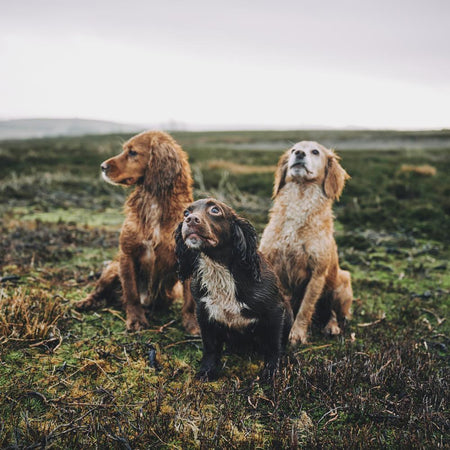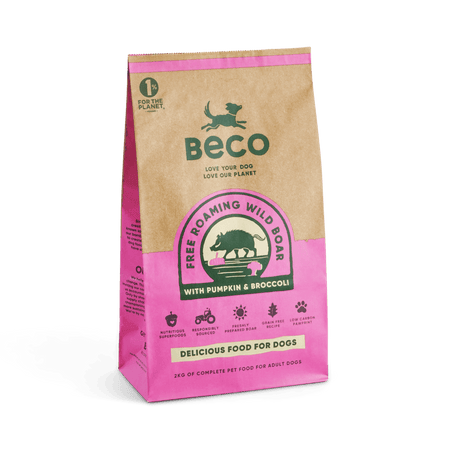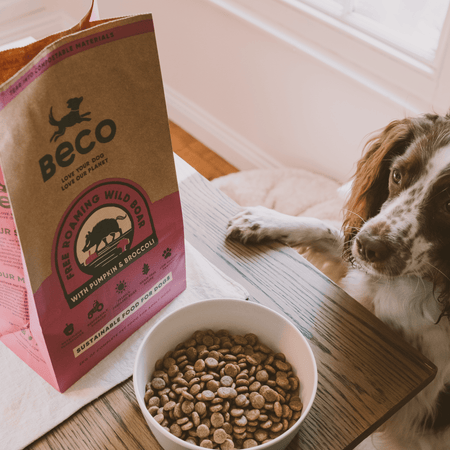A question as old as time itself, and a topic that many shy away from. But a dog’s poop can be an important indicator of his/her overall digestive health. It’s important, therefore, that we, as loving dog owners, check their stool from time to time.
Besides the composition of the stool itself, another good indicator of gut health is the frequency of stools. With that in mind, we’ve put together this comprehensive guide answering questions on just how often your dog should be pooping.
How Often Should Dogs Poop?
There’s no simple answer to this question. Some dogs poop more than others, simply because that’s just the way they are. But a good rule of thumb is that dogs should poop at least once a day. Some may poop up to five times, and others in between. So if your dog poops 3 times a day, that’s fine too. Anything over five, though, could be worth keeping an eye on.

What Time Do Dogs Poop?
There’s no special poop time zone. It takes dogs roughly four hours to digest their food. This usually works out as being first thing in the morning or early in the evening. It’s worth mentioning that the above is for adult dogs.
How often should a puppy poo, we hear you ask? Well, puppies will often poop more than five times per day as they eat little and often, so their digestive system is always working at maximum capacity and what comes out the other end follows suit.
What Can Change How Often a Dog Poops?
There are many things that can have an impact on your dog’s digestive system and how often they need to do their business. Some are unavoidable and caused by things beyond your, or your dog’s, control; others can be solved or, at least, lessened to an extent:
How much they’ve eaten in the last 24 to 48 hours. This is fairly plain and simple; the more dogs eat, the more they need to poop.
The amount of fibre in their diet. Dog food needs an even balance of the right fibre. Too much can cause constipation.
Age. Younger dogs poop a lot more often, whereas older dogs tend to poop less.
Medication. Certain types of medication may have an impact on your dog’s digestive system, increasing or reducing how often they poop.
Stress. Just like humans, how dogs feel can sometimes cause them to have irritable bowels.
Dogs will show irregular pooping patterns throughout their lives, but there are two ends to the spectrum which are less common. In this instance, we’re talking about diarrhoea and constipation. These can both be caused by a number of factors similar to the ones listed above, things like eating too much or eating poor quality food. Roundworms and ringworms can also cause issues with your dog’s pooping frequency/regularity, too.
How to Solve Irregular Pooping
If your dog appears to be struggling with constipation or diarrhoea, then the first thing you need to do is consult your vet. They’ll help you diagnose the problem and help you find a solution.
For dogs with diarrhoea, there are some things you can try yourself.
Fasting for 12 hours should allow your dog’s tract to settle down and their stool to firm up. Another option may be switching them to sensitive stomach dog food to help ease anything that’s upsetting their digestive health.
If your dog appears to have constipation, then you should look to buy food that’s high in fibre and encourage them to drink more; fluid helps to keep things moving. This should help get things back to normal and restore an ideal balance. Exercise is also a great way to help food move through the intestine faster, so a walk or some playtime in the garden can help, too.
The Bottom Line
While the frequency of your dog’s poop is something to keep an eye on, there are other things that tell us more about their digestive health. Even if your pooch appears to be pooping a lot more than usual, it’s not something you should be too concerned about if the poop is well-formed and looking healthy as these things can.
As long as the state of their stool ticks the below criteria, then their increased poop rate is likely to be down from eating too much food. Generally speaking, if the stool is okay, then there’s no need to panic.
Healthy Poop Checklist
Consistency
Healthy poop should be compact, moist and hold its shape when you pick it up. If it’s watery and runny, then it’s likely they’ve got an upset stomach.
Shape
The shape of your dog’s poop should be like a log, and should largely maintain this shape when you pick it up with compostable poop bags.
Size
This really does depend on the size of your dog. Smaller dog breeds should obviously have smaller poop compared to a Great Dane or Mastiff. The general rule is that your dog poop should be consistent. If it’s larger than normal, this could suggest food isn’t being digested properly; if smaller, then it could be down to a loss of appetite, illness or a blockage.
Colour
Dog poop should be light or dark brown – any other colour could be a cause for concern. The colour of your dog’s poop is a great indicator, so make sure to give it a second glance from time to time
How Many Times a Day Should a Dog Poop? | Conclusion
There’s no definitive answer for the number of times a dog should poop every day. Each dog is different, and their digestive systems are, too. Generally speaking, they should be pooping at least once per day, though.
It’s important to keep a watchful eye and identify anything unusual or irregular. But as long as their stool is the right colour, maintains its shape, consistency and size, then it’s likely everything is okay. They’re probably just having one of those days.
Since we’re talking about poop, we’d thought it’d be a good idea to remind you of the things you need to deal with your dog’s business. Our eco friendly dog poo bags make the perfect partner when out and about with pooch. We also provide a tough and durable dog poop bag dispenser.













